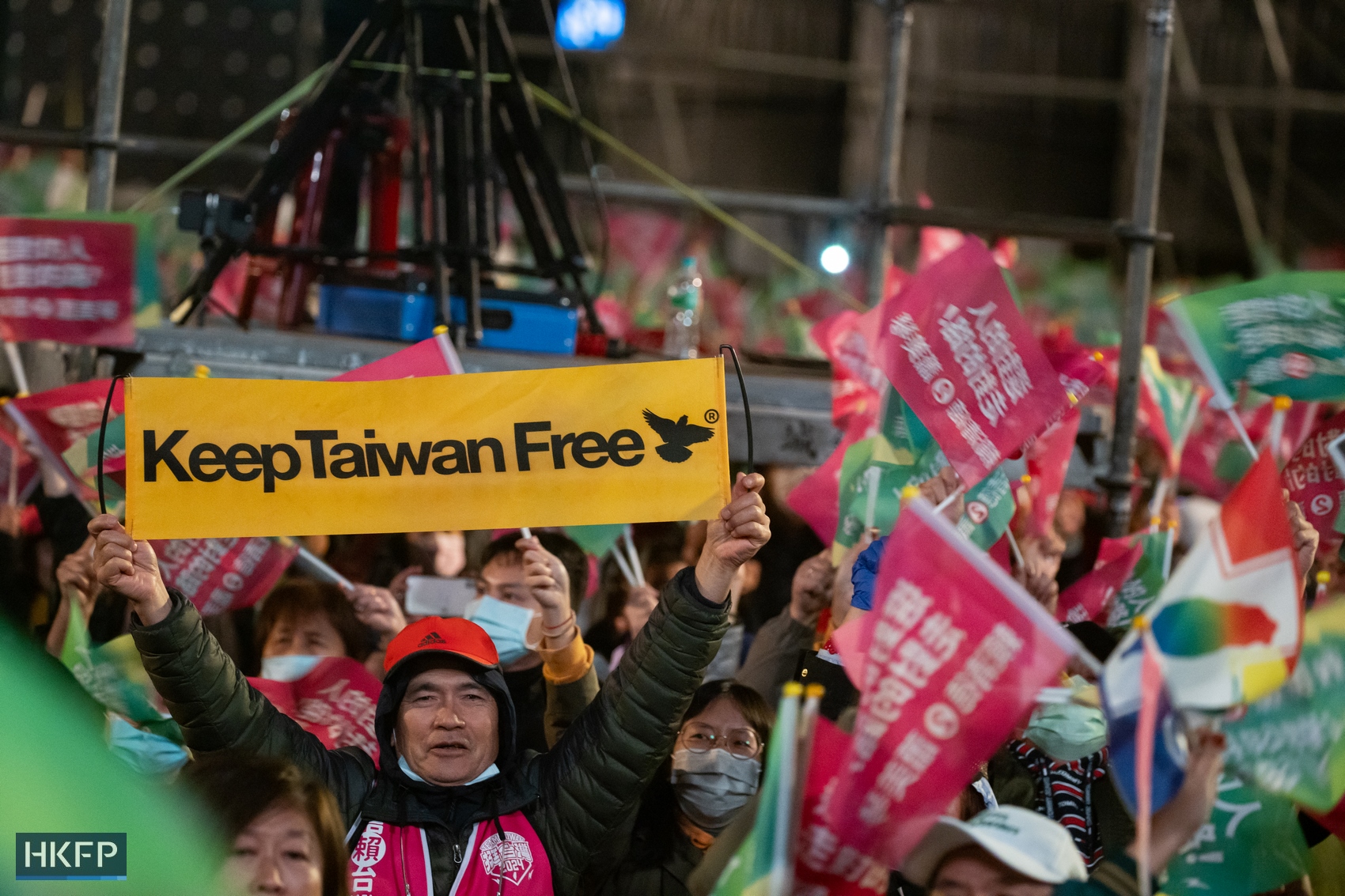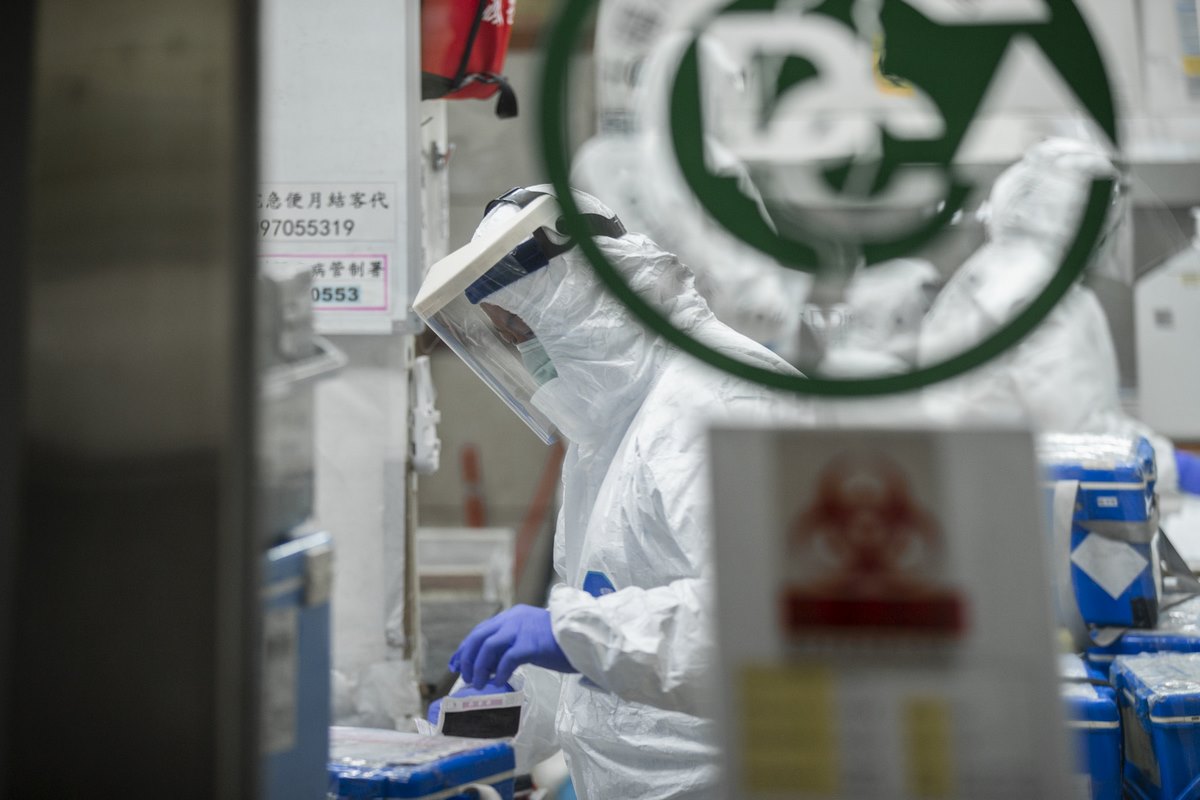Taipei, Taiwan
Who will lead Taiwan for the next four years will be decided on Saturday, when over 19.5 million eligible voters head to the polls from 8 am. New legislators will also be chosen for the self-ruled island, which Beijing considers to be part of China that must be unified, by force if necessary.

Amid a rapidly ageing population, Taiwan’s six-million young voters aged 20 to 39 are considered a key force that could sway the result. They played a crucial role in outgoing leader Tsai Ing-wen’s decisive victory for the Democratic Progressive Party (DPP) in 2020, when she was re-elected with more than eight million votes, of 57.1 per cent of the popular vote.
HKFP spoke to some young Taiwanese voters about the three election hopefuls – William Lai Ching-te of the ruling DPP, Hou Yu-ih of the opposition Kuomintang (KMT) and Ko Wen-je of the Taiwan People’s Party (TPP).
What do they look for in the new leader of Taiwan, and what issues must be tackled by the new administration?
Political ideology
Speaking to HKFP on Thursday two days before the election, Jerry Hu, a film student at Taipei National University of the Arts, said the atmosphere of this year’s election was less fervent than the last presidential race.

Lai, Hou and Ko presented “less contrasting views” on important issues such as relations with China, the 27-year-old said. With Hou, the KMT, which has advocated for closer ties with Beijing, had adopted a more “ambiguous” stance than with its previous presidential candidate Han Kuo-yu to avoid alienating young voters, Hu said.
Historically, the KMT’s position on China has appealed to an older generation, and has made it harder for the party to connect with the island’s youth, who largely identify as “Taiwanese” rather than “Chinese.”
He went on to say that young Taiwanese were frustrated by soaring property prices, with many accepting that they might never be able to afford to buy their own home. No matter which candidate takes office, it would be very hard for the new leader to change this “reality,” he said.
The film student said he would be casting his ballot for Lai because of the DPP’s pro-democracy stance and its position of “not backing down” when faced with conflict with China.

Ultimately, it came down to which party was closest to his core values. “The policies they proposed are not too different in nature,” he said.
Personality
Finance worker Winnie told HKFP on Wednesday that while internal socio-political issues must be addressed by the new administration, foreign affairs and national defence policies took priority when choosing a new leader for Taiwan, which has a complicated diplomatic status.

Under Beijing’s one-China policy, mainland China maintains that nations cannot have official relations with both Beijing and Taipei, resulting in the island enjoying formal diplomatic ties with just 13 sovereign states.
See also: Explainer: Is Taiwan a country? The democratic island’s tangled history, and disputed status
The 32-year-old, who identified herself as “pro-Taiwan” and refused to reveal her voting intention, said the new leader should maintain the status quo and avoid escalating tensions with China. They should also be presentable and able to interact with international powers, she said.

“You can tell from a candidate’s personality whether they are suitable to be president. It includes how they speak and the way they interact with international guests. I think this is the most important factor,” she said.
Aesthetics
Major political and social issues aside, 30-year-old theatre worker Nick Wu told HKFP that cultural policies and the administration’s “sense of beauty” were deciding factors in him choosing incumbent vice-president Lai as the next leader.
If Lai were to take office, the Taiwanese government would carry on most of its existing measures, especially efforts to cultivate and develop the cultural industry, Wu said.
Under DPP rule, Wu said he had seen improvements in “aesthetics,” citing more visually pleasing designs for publicity materials. The importance attached to beauty was crucial to the development of society, the cultural worker said.

“Taiwan has always put a stronger emphasis on pragmatism, or being very goal-oriented. The pursuit of beauty is a gradual but important process,” he said.
He had considered voting for Ko, Wu said, but the politician’s “inconsistent stance” made him question his integrity. The ex-Taipei mayor also had remarked that art was “below par,” which led Wu to believe the TPP candidate would not allocate many resources to the cultural sector.
No empty talk
Among around 1,000 people who attended a rally for Ko near Taipei’s North Gate Square on Thursday night was 33-year-old Shirley. Like many TPP supporters, she was wearing a grass-shaped headpiece and held up a small light, as she listened attentively to speeches delivered by Ko’s campaign team and politicians who backed him.
Shirley, who described herself as politically apathetic in the past, said she had not paid much attention to previous elections because they were dominated by the two main parties. What prompted her to support Ko was her discontent with the handling of the Covid-19 pandemic by Tsai’s government. The shortage of hospital beds and medical staff, which put a lot of pressure on frontline healthcare workers like herself, made her question “what were the authorities doing?”

After the pandemic, Shirley began to pay more attention to then-Taipei mayor Ko and his policies. She described the TPP founder as a high-performing politician, citing improvements in Taipei she had witnessed since moving there from her hometown of Kaohsiung five years ago.
“He really had people’s livelihood in mind and executed policies to [help them],” she said.
The green headpiece and light had been given to Shirley as souvenirs for acting as Ko’s campaign volunteer. She admitted it was a major change compared to her previous political indifference.
The long-standing political rivalry between the DPP and KMT clouded people’s judgement in choosing the right leader for Taiwan, Shirley remarked. “They could only see colours when it came to politics,” she said.
“The reason I am standing out is because I really can’t stand the blue camp and the green camp, which only do empty talk. I really can’t feel any changes they bring to people’s livelihood,” she said, adding the DPP had been at the centre of multiple corruption scandals in recent years.

Asked if Ko had a chance at winning the presidency, Shirley said it would be a “tough race.” She would motivate undecided voters around her to cast their ballot for the TPP candidate, she added.
‘Straightforward and honest’
Another TPP supporter Peter Chen, a global trading worker who often travels between Taiwan and Hong Kong, told HKFP that he thought this year’s election was “different” than ones in the past because there was a centrist candidate.
Through reading social media posts and watching YouTube videos, Chen said he thought the ex-Taipei mayor, who has 1.1 million followers on Instagram, was “different” from other politicians. He spoke in a straightforward and honest manner and would admit his mistakes, Chen said, adding members of the public could easily understand his ideals.
He went on to say he agreed with Ko’s stance on cross-strait relations, saying he felt that Taiwan could neither claim independence nor achieve unification with China at present.

“I think we should not focus on things that can’t be achieved at the moment, and focus on what we can actually do,” he said.
Pragmatism
Lei Chih-ling, an archaeology student at the National Cheng Kung University, said the KMT was “detached” from public opinion. The issues the party concentrated on, such as the “1992 Consensus,” did not align with young people’s concerns, she told HKFP.
The 1992 Consensus refers to a controversial doctrine stating that both sides of the Taiwan Strait belong to “one China,” albeit with differing interpretations of “China.” Young voters were more interested in livelihood issues than political controversies, Lei said.
“It is impractical for [KMT] to talk to young people about the 1992 Consensus. We just want to make sure we can afford to have enough to eat,” the Tainan-based student said.

Among the three presidential candidates, Lei said she believed Ko was most able to address young people. She said she also sided with his position that Taiwan should be the “bridge of communication” between China and the US, rather than a flashpoint of their rivalry.
Lei had solidified her support for Ko and his party in recent months by becoming a member of TPP.
“I think this position is the most pragmatic. Taiwan acting as the bridge between China and the US is the best way for the two countries to interact with each other,” she said.
Ko on Friday described himself as the only “acceptable” candidate to both China and the US, as he vowed to improve communication with Beijing to reduce “miscommunication.”
Lei had voted for Tsai in the 2020 election, but she decided not to give her vote to the DPP this time. She criticised the government as lacking preparation when it decided to “live with the virus” during the Covid-19 pandemic. She cited a personal experience of failing to secure Covid-19 medicine after being infected, and was hospitalised because she had fainted at home.

The DPP made many promises when Tsai began her first term in 2016, but her administration had performed poorly over the past eight years, including failing to alleviate the housing crisis in Taiwan, Lei said.
Responding to criticism of Ko for his “swaying stance,” Lei said the change in Ko’s position over the years reflected his pragmatism. He would be willing to cooperate with different people for the greater good of Taiwan, she said.
“Whatever stance you hold on to, is it really good for the people? This is something I think presidential candidates should think about,” she said.
Dateline:
Taipei, Taiwan
Support HKFP | Policies & Ethics | Error/typo? | Contact Us | Newsletter | Transparency & Annual Report | Apps
Help safeguard press freedom & keep HKFP free for all readers by supporting our team

LATEST FROM HKFP
HKFP has an impartial stance, transparent funding, and balanced coverage guided by an Ethics Code and Corrections Policy.
Support press freedom & help us surpass 1,000 monthly Patrons: 100% independent, governed by an ethics code & not-for-profit.










